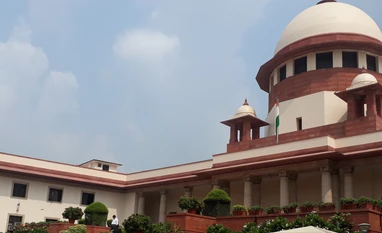The Supreme Court on Thursday asked the Centre how same-sex partners can get access to certain social rights without being granted marital status.
Solicitor General Tushar Mehta submitted that the right to cohabit, the right to choose a partner, and the right of sexual orientation are fundamental rights but there is no fundamental right to seek recognition of that relationship as marriage or in any other name.
Chief Justice of India (CJI) D Y Chandrachud said once the Union recognised the right to cohabit as a fundamental right, it must ensure that the social impact of cohabitation has legal recognition. “We are not going into marriage right now at all. The reason why we’re trying to push you to this is because we take your point that the court’s remit is not to legislate. But short of that, our law has gone so far. What does the government want to do to ensure that these cohabitatory relationships…they must be recognised to ensure security and social welfare. And by doing that, we can ensure in future that these relationships will cease to be ostracised in society,” the CJI told Mehta, who argued for the Centre.
The Constitution Bench of the CJI, Justices Sanjay Kishan Kaul, Ravindra Bhat, Hima Kohli and P S Narasimha continued hearing submissions on behalf of the respondents in a batch of petitions seeking marriage equality rights for the LGBTQIA+ (lesbian, gay, bisexual, transgender, queer, questioning, intersex, asexual) community.
The Bench asked the Centre if they could come up with measures giving financial security to same-sex couples by allowing them to have a joint bank account or name their partner as a nominee in an insurance policy. The CJI suggested that there were ministries dedicated to social justice and empowerment, such as women and child development.
The Bench also indicated that the Centre should see if there can be separate legislation to protect the rights of same-sex couples. Mehta replied that he could attempt to take up the suggestion since it came from the Bench.
Also Read
Centre’s arguments
The solicitor general, on the sixth day of the hearing, said the Petitioners had argued that they have a right to choose sexual orientation. However, the CJI countered that sexual orientation is not a matter of choice but is innate to a person.
Mehta then argued that there still are two schools of thought — one says that sexual orientation can be acquired, and other says it is inbuilt.
He then drew a comparison between incestuous relations and homosexuality. He suggested incest is not uncommon but prohibited worldwide. “Could this be thrown open to challenge?” he asked.
He also said that the Special Marriage Act (SMA) is interwoven with personal laws and any change to it will have consequential changes to personal laws.
“It is pertinent to know how one can identify who will be the wife in a gay marriage and who will be the wife in a lesbian marriage. Under our laws, protective rights are granted to the wife, such as maintenance rights, alimony and custody,” he said.
The chief justice then highlighted the three arguments advanced by the Union of India on the problems that will arise if the apex court were to read provisions of the SMA as the petitioners have argued. “Firstly, it will involve substantial rewriting of the provision. Secondly, it will amount to interference in matters of public policy. Thirdly, it would interfere in the realm of personal law and the court will not be able to avoid the interplay between SMA and personal law,” the bench summarised.
In response, the solicitor general pointed out that there is a fourth problem — the court cannot read any statute that leads to different interpretations of the statute by different classes.
The court will resume hearing the arguments on May 1.
)